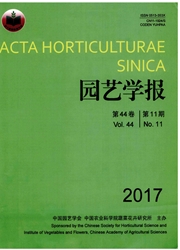

 中文摘要:
中文摘要:
[目的]探讨苗期夜间低温处理对番茄叶片蔗糖合成能力的影响。[方法]以15℃夜温为对照,研究了6℃夜间低温处理1、3、5、7d对番茄叶片中蔗糖合成能力的影响。[结果]经过夜间低温处理,番茄叶片中的果糖、葡萄糖和蔗糖含量在处理期间6:00时皆大于对照,11:00时则相反;处理和对照植株在6:00时番茄叶片中的果糖、葡萄糖和蔗糖含量皆低于11:00时。番茄叶片中的淀粉含量在处理期间6:00和11:00时皆较对照有所增加。夜间低温处理使番茄糖代谢酶活性发生了改变,处理期间6:00和11:00时处理植株的酸性转化酶(AI)和中性转化酶(NI)活性皆高于对照,而蔗糖合成酶(SS)和蔗糖磷酸合成酶(SPS)活性皆低于对照;处理植株11:00时的所有酶活性皆高于6:00时,对照植株11:00时与6:00时相比转化酶活性降低,而合成酶活性升高。在夜间低温处理过程中处理植株的蔗糖合成酶活性降低,叶片中11:00时蔗糖增加量小于对照,说明夜间低温处理降低了番茄叶片的蔗糖合成能力。[结论]为番茄设施高产栽培的环境控制提供了理论依据。
 英文摘要:
英文摘要:
[Objective] The aim was to explore the effects of low night temperature treatment on sucrose synthesis ability of tomato leaves in seedling stage.[Method] Effects of low night temperature of 6 ℃(with 15 ℃ as control)on the sucrose synthesis ability of tomato leaves were studied after 1,3,5,7 d of treatment.[Result] The contents of fructose,glucose and sucrose in tomato leaves were higher than control at 6:00 during the treatment of low night temperature,but in contrast at 11:00.The contents of fructose,glucose and sucrose in tomato leaves of low night temperature treatment and control group at 6:00 were lower than that at 11:00.The content of starch in tomato leaves was higher than control at 6:00 and 11:00 during the treatment.And the activities of sugar metabolism enzymes of tomato were changed by the treatment of low night temperature.The activities of acid invertase(AI)and neutral invertase(NI)were higher than those of control,while the activities of sucrose synthase(SS)and sucrose phosphate synthase(SPS)were lower than control at 6:00 and 11:00 during the treatment.The activity of all the enzymes at 11:00 of low night temperature treatment plants treated for 1,3,5,7 d was higher than that at 6:00.Compared to 6:00,the invertase activity of the control plant decreased,while the synthetase activity increased.The activity of sucrose synthase(SS)was decreased for treated plants,and the increase amount of sucrose content in leaves was lower than that of control at 11:00 during the treatment,indicating that the sucrose synthesis ability of tomato leaves was decreased by the treatment of low night temperature.[Conclusion] The results in this study had provided theoretical basis for the environmental control of high-yield cultivation of tomato.
 同期刊论文项目
同期刊论文项目
 同项目期刊论文
同项目期刊论文
 期刊信息
期刊信息
